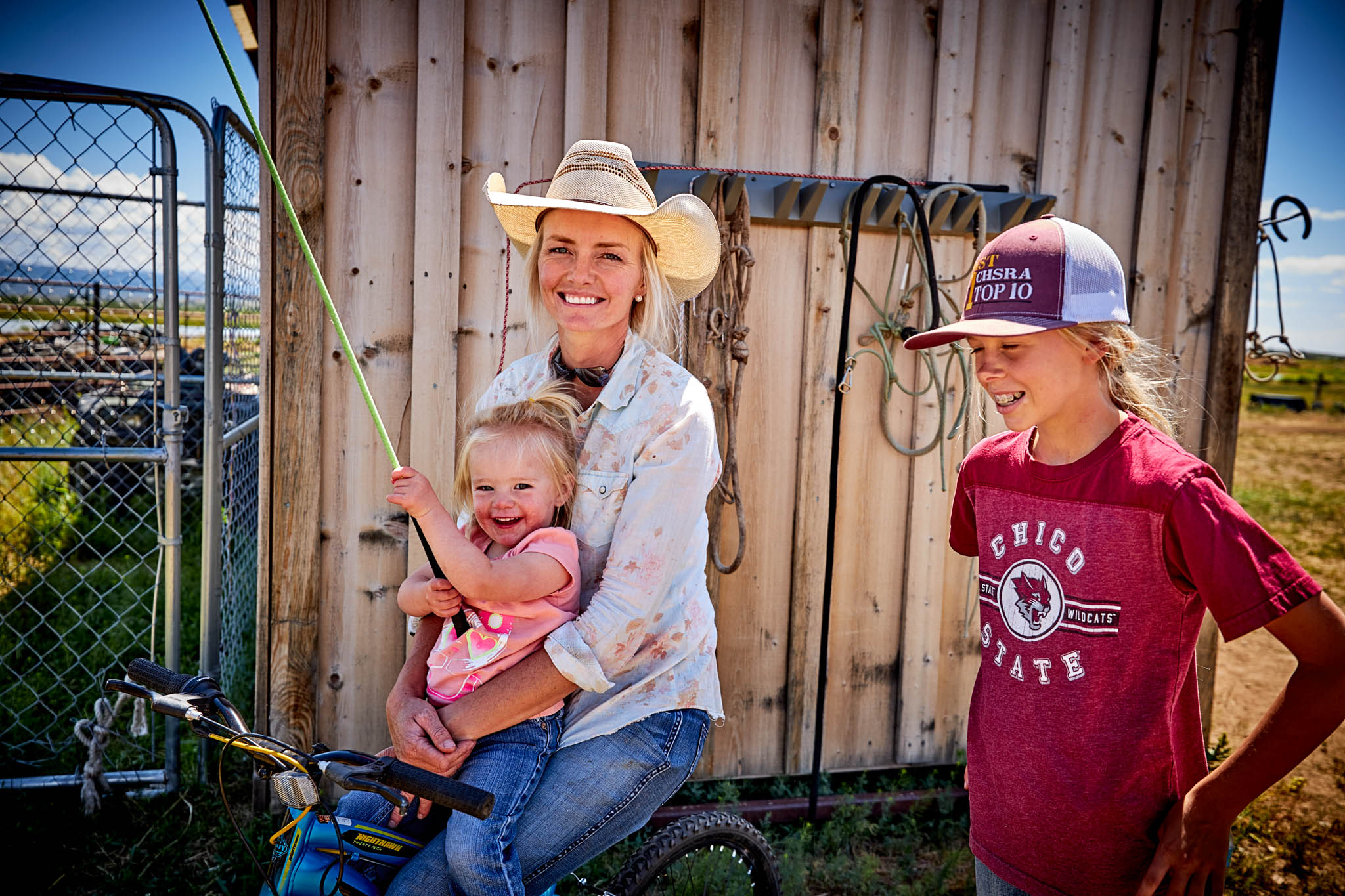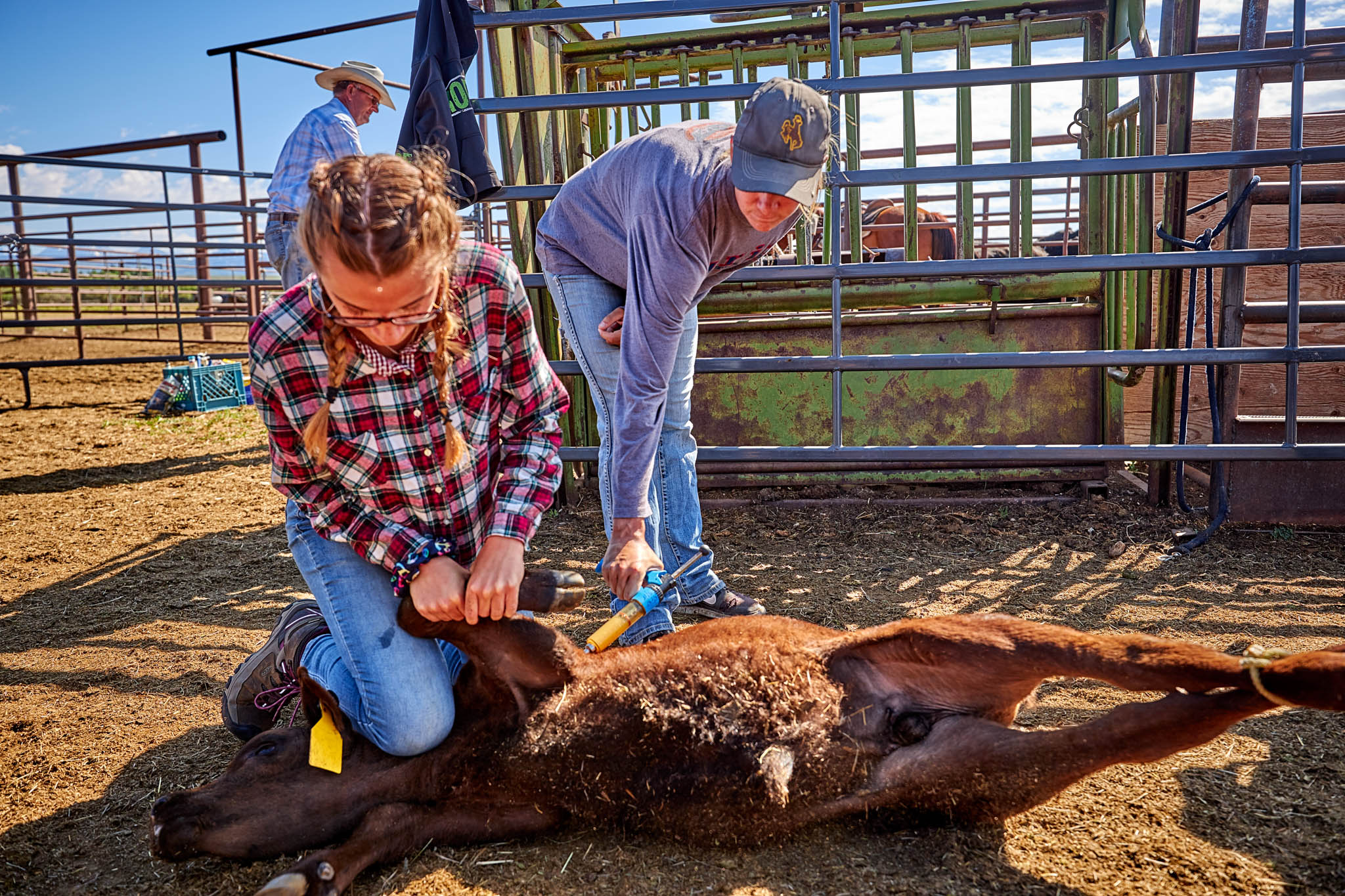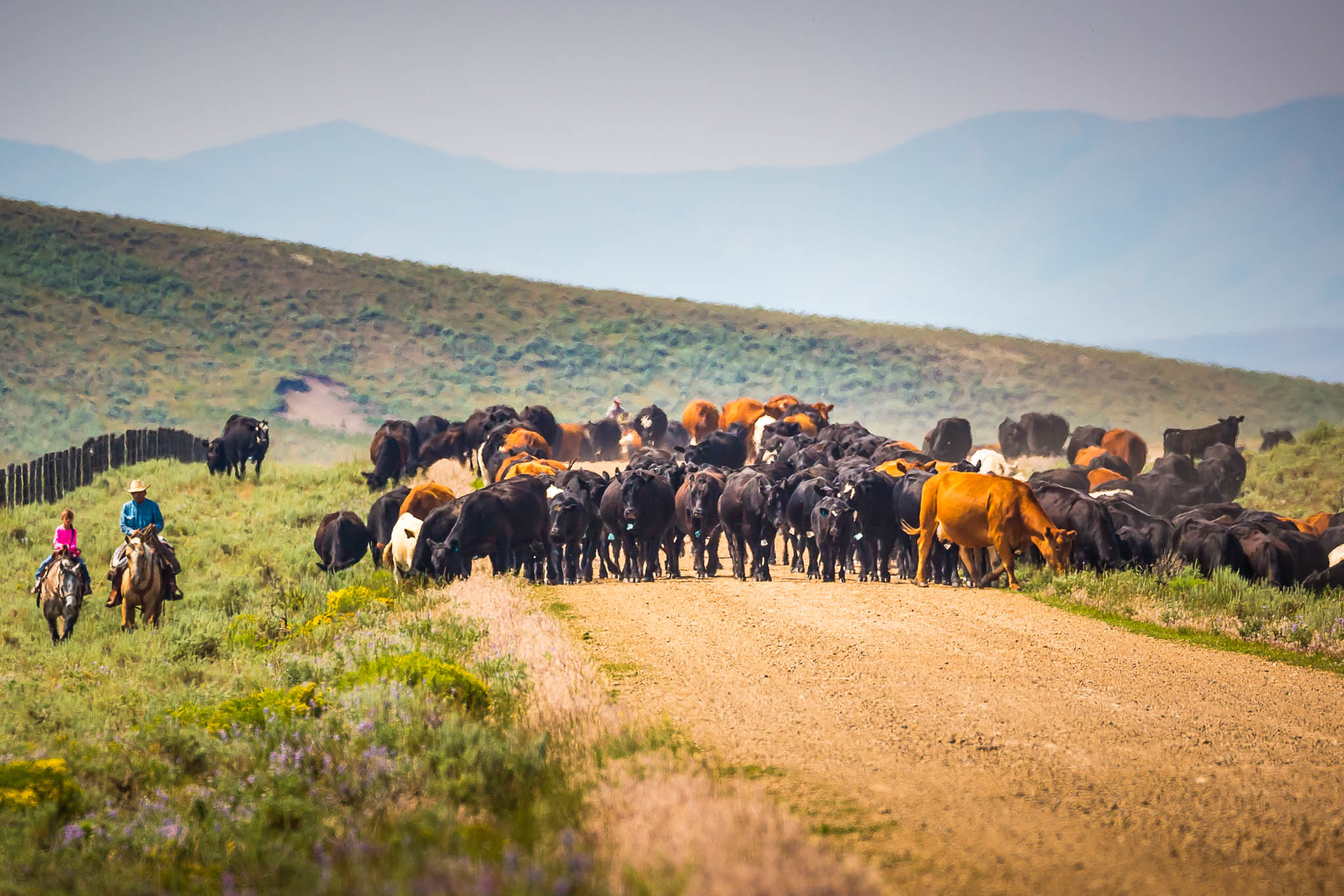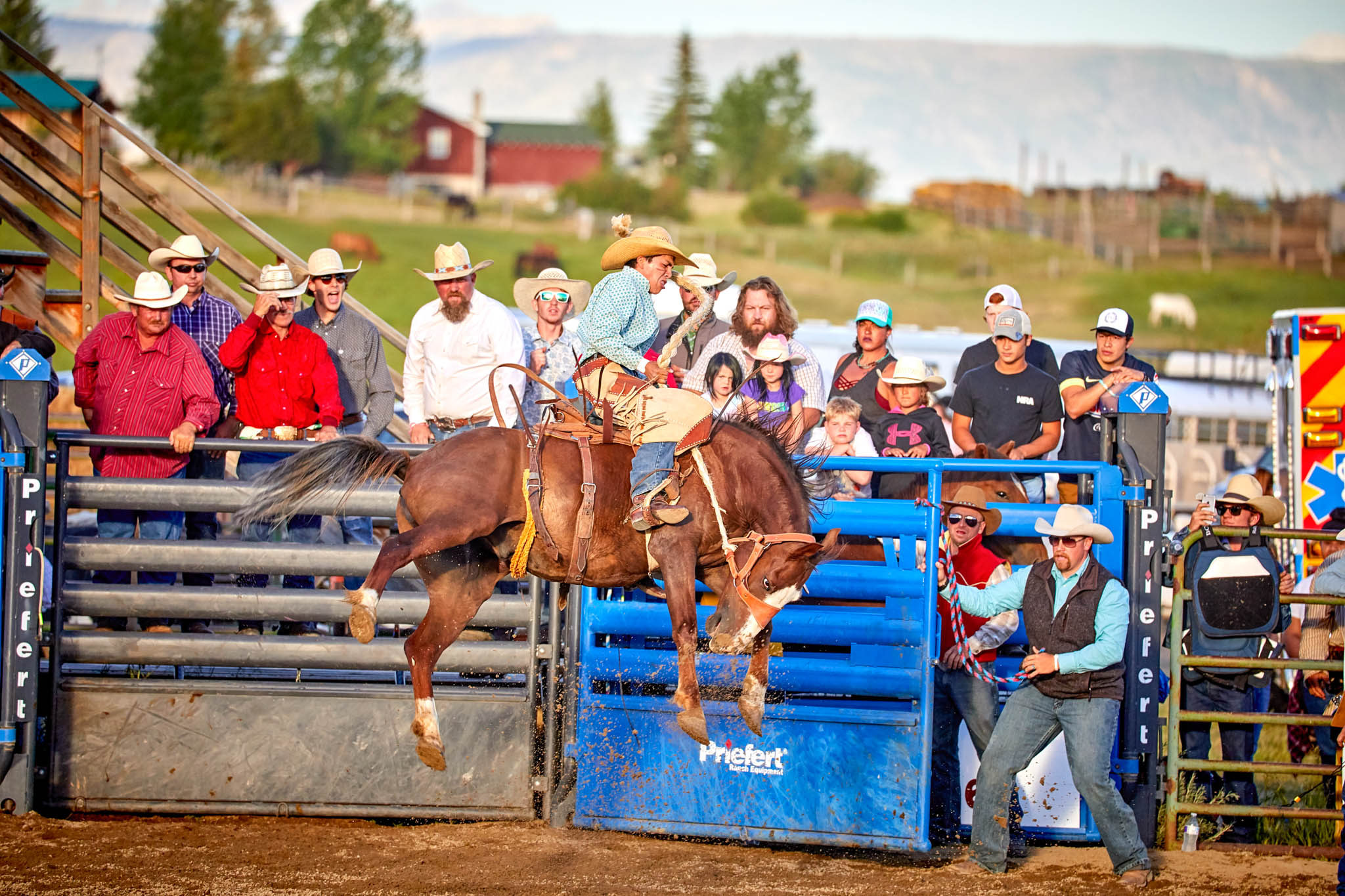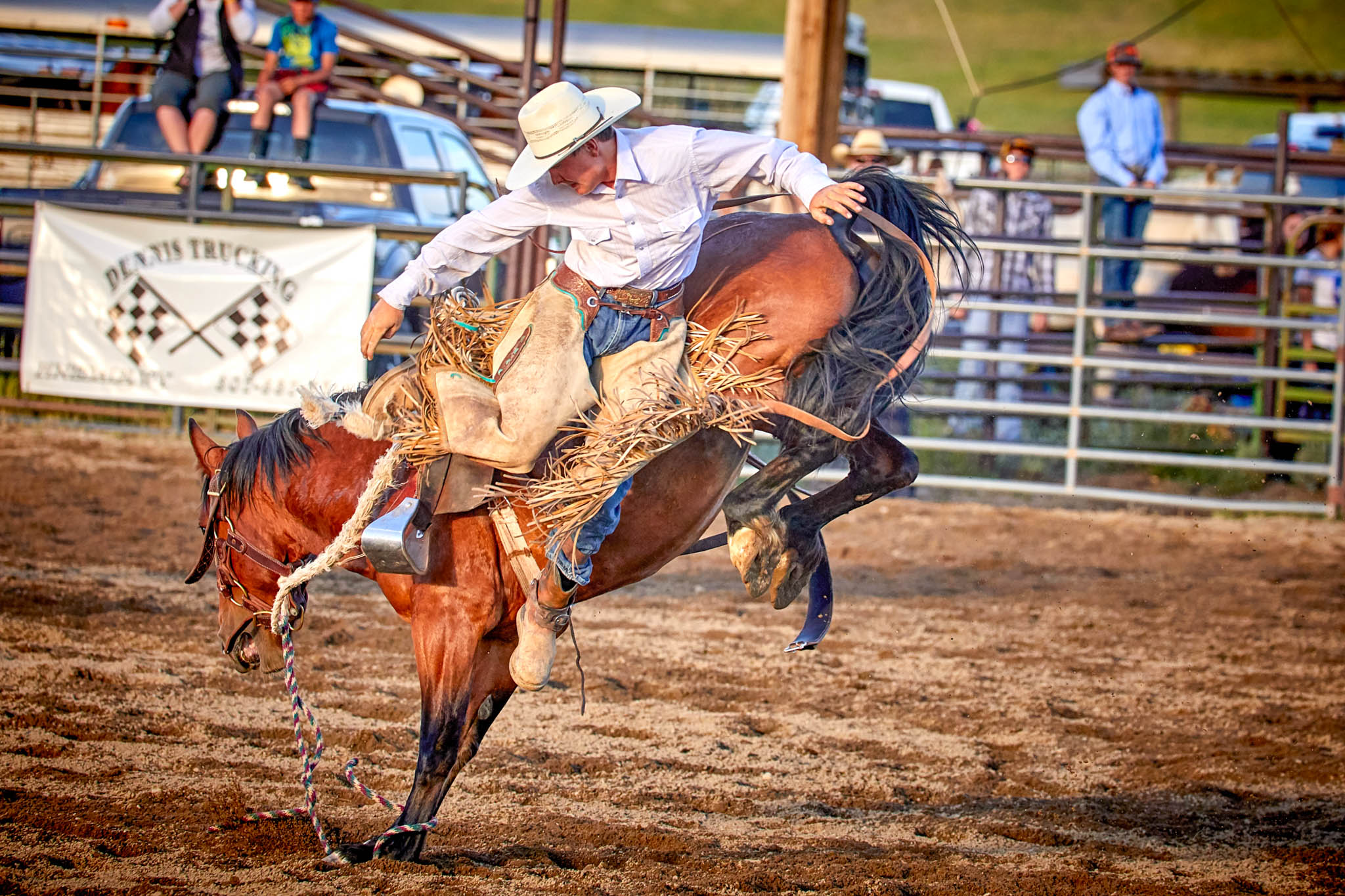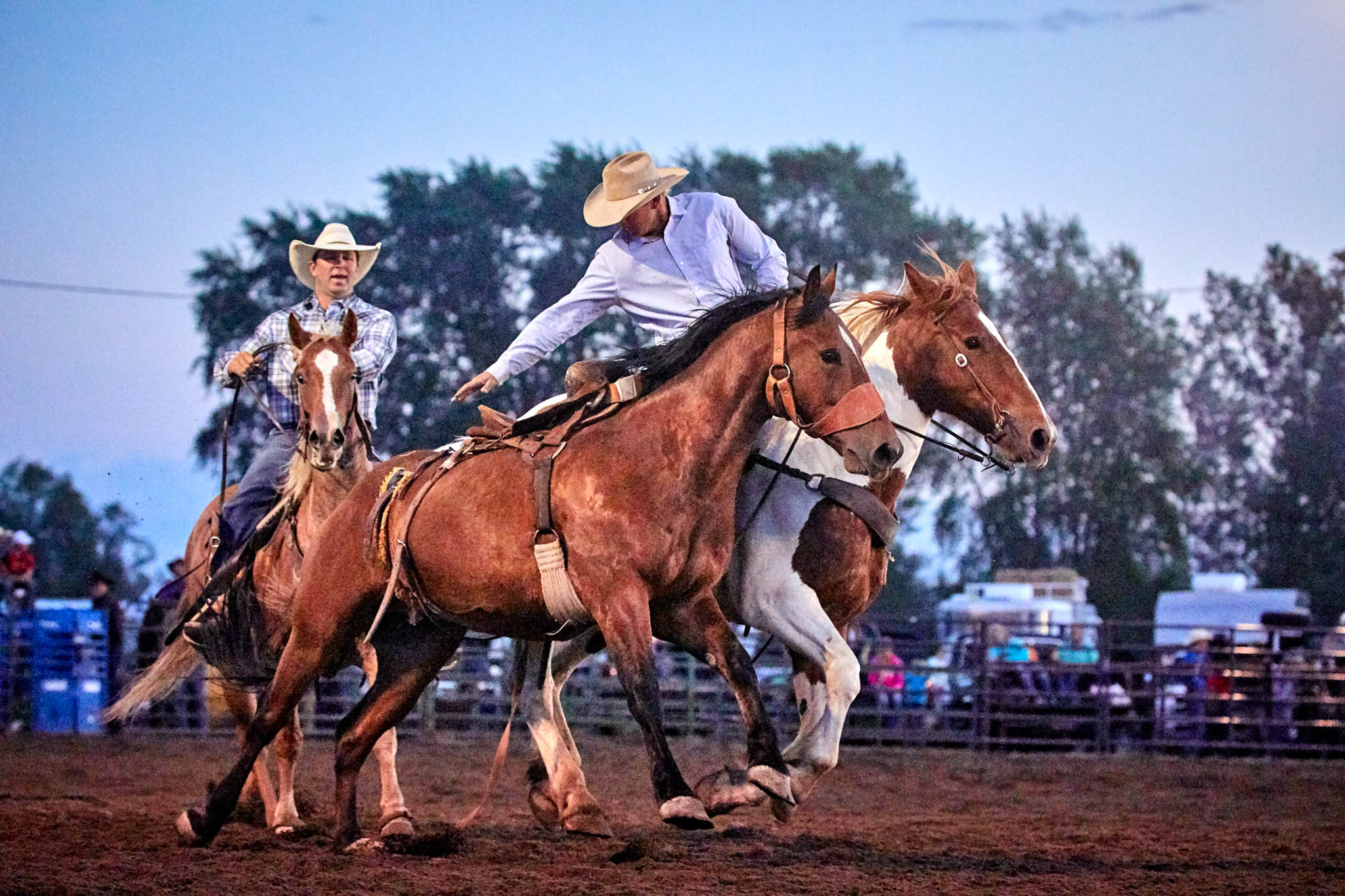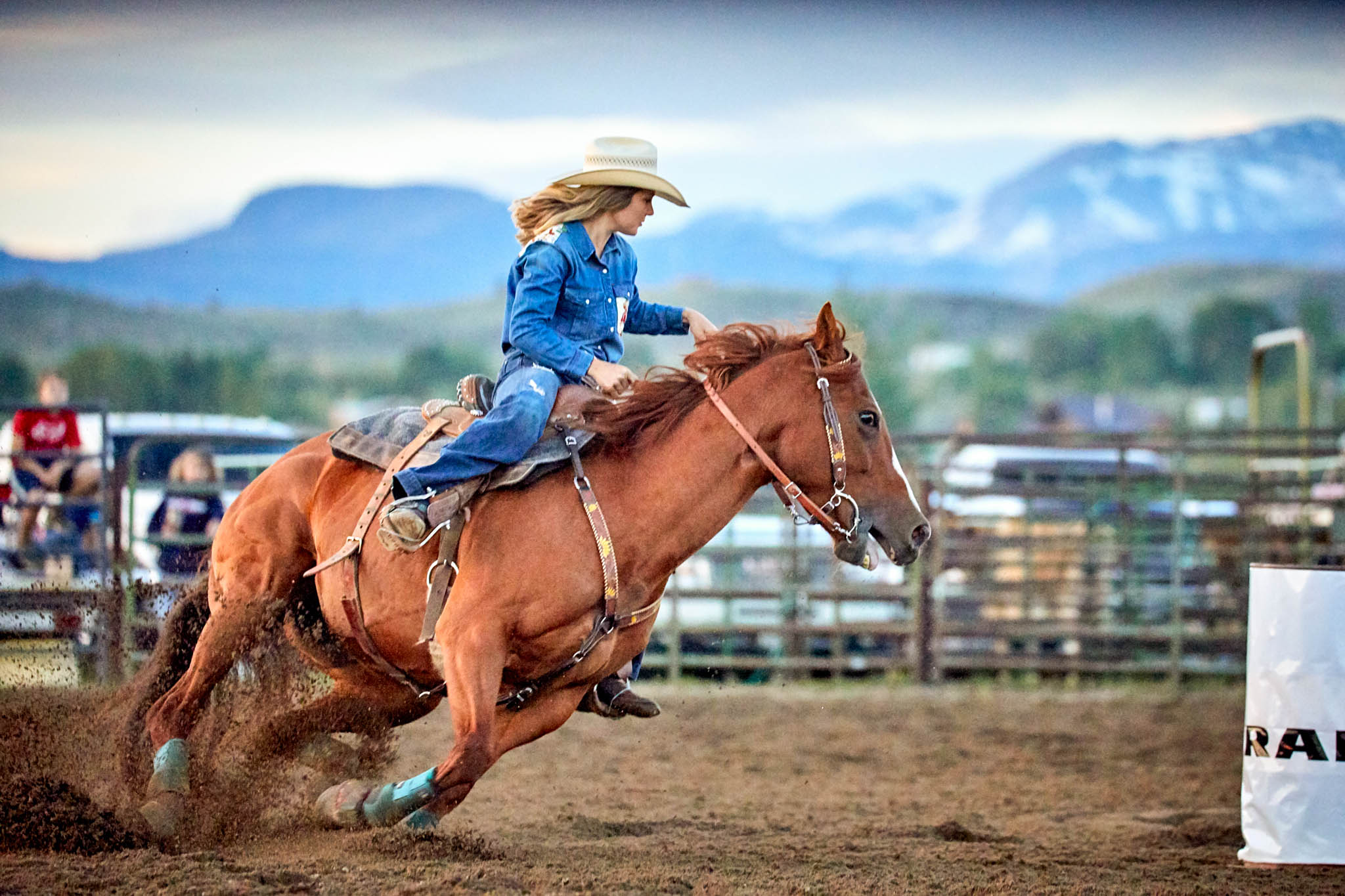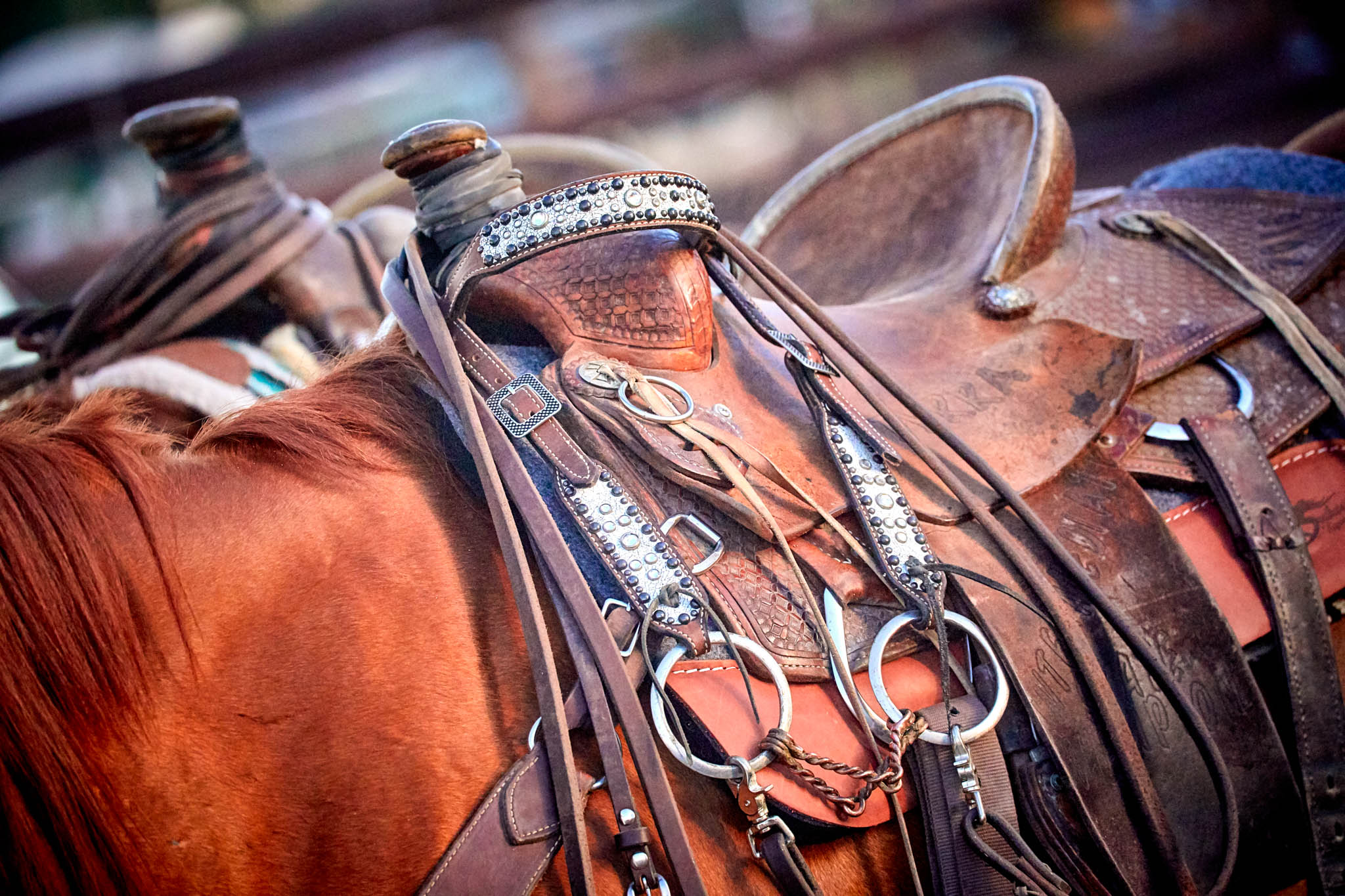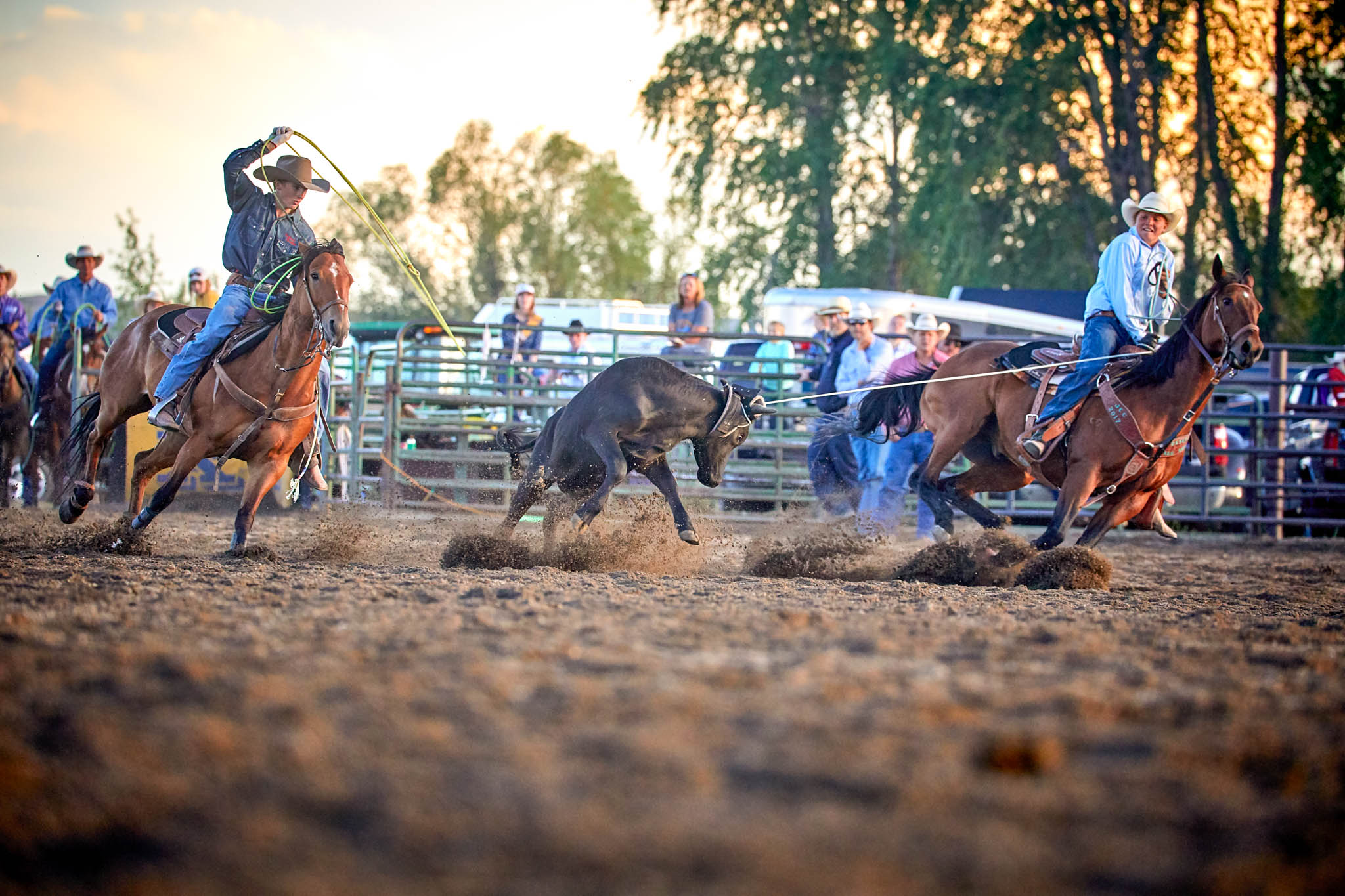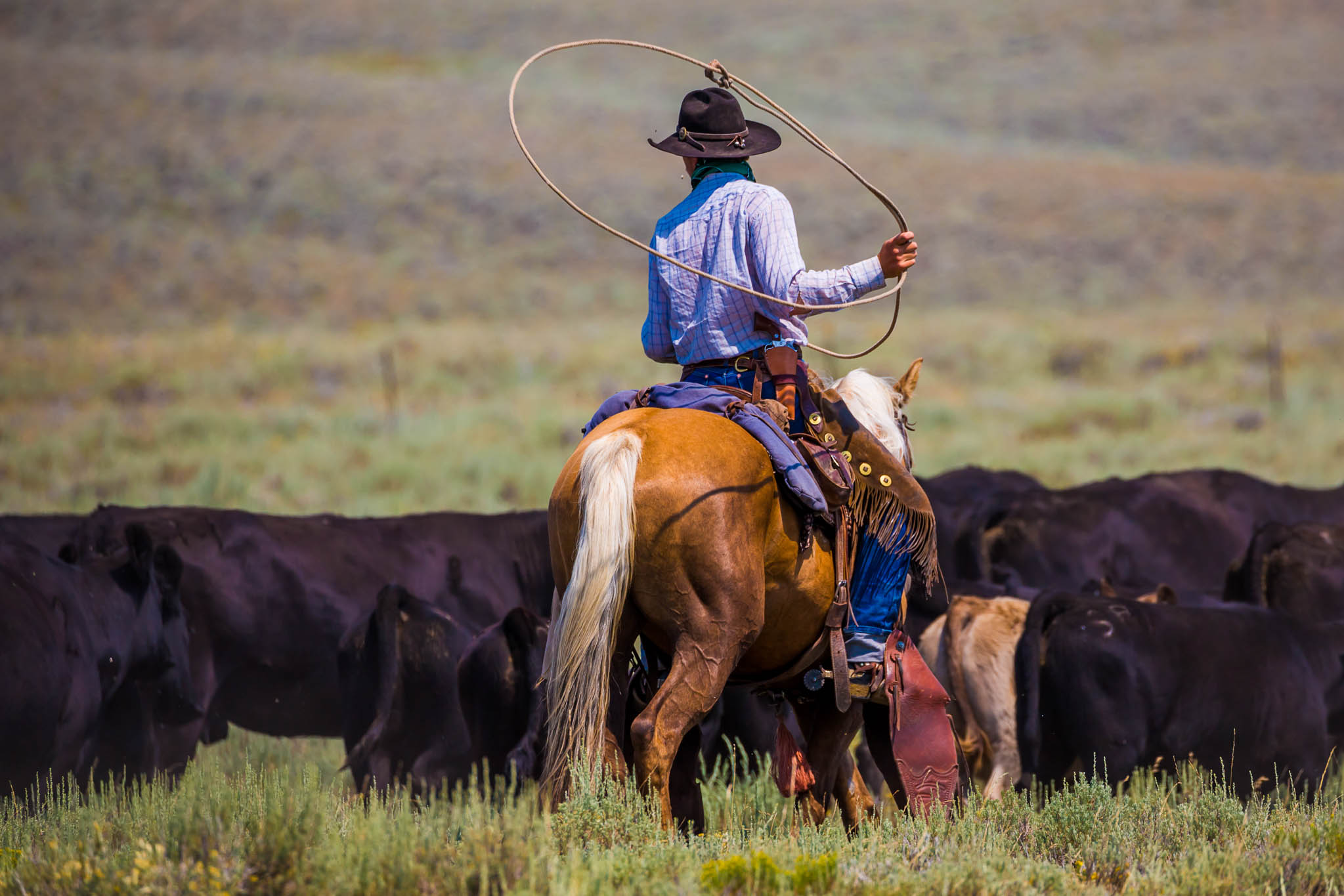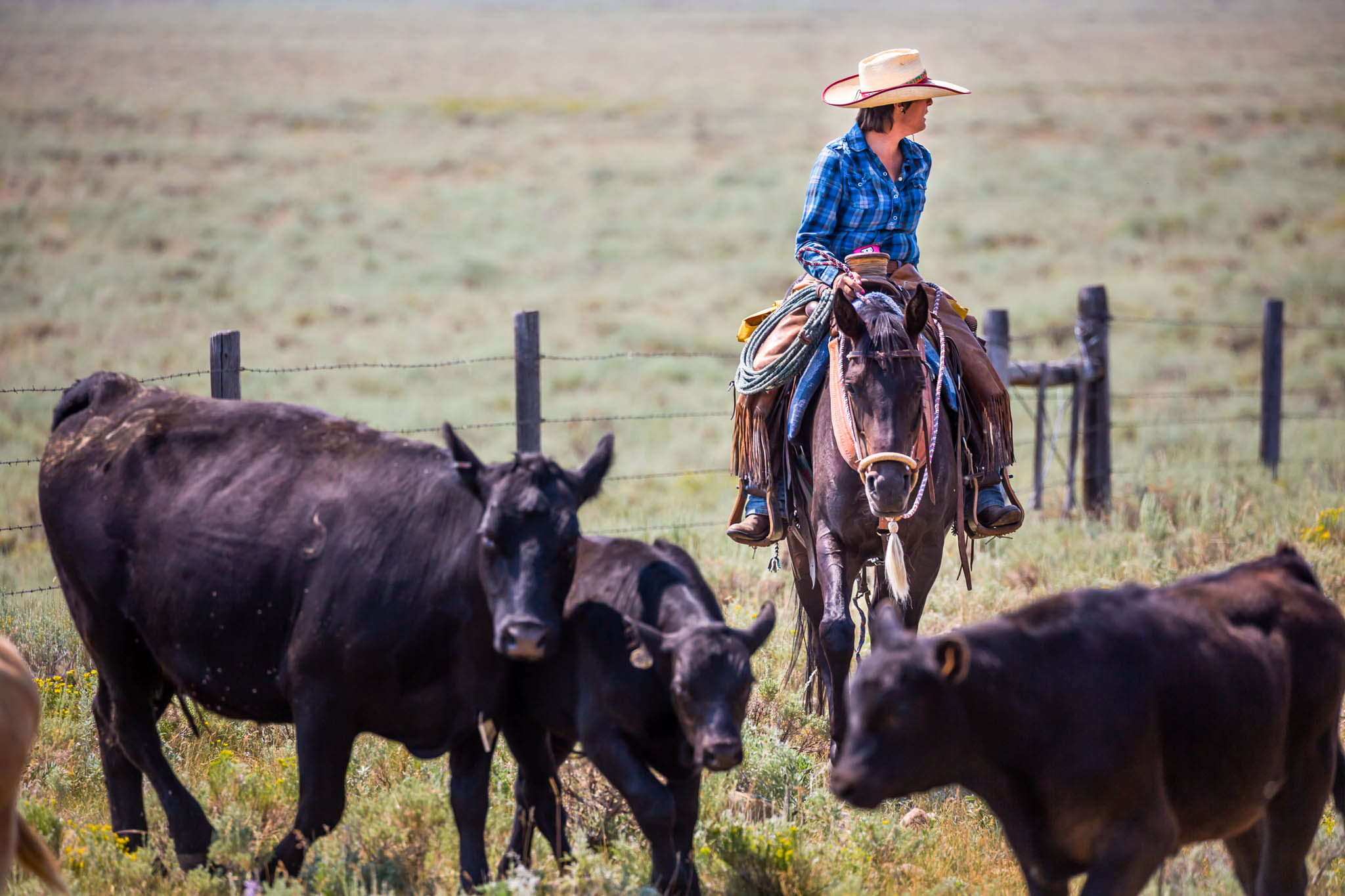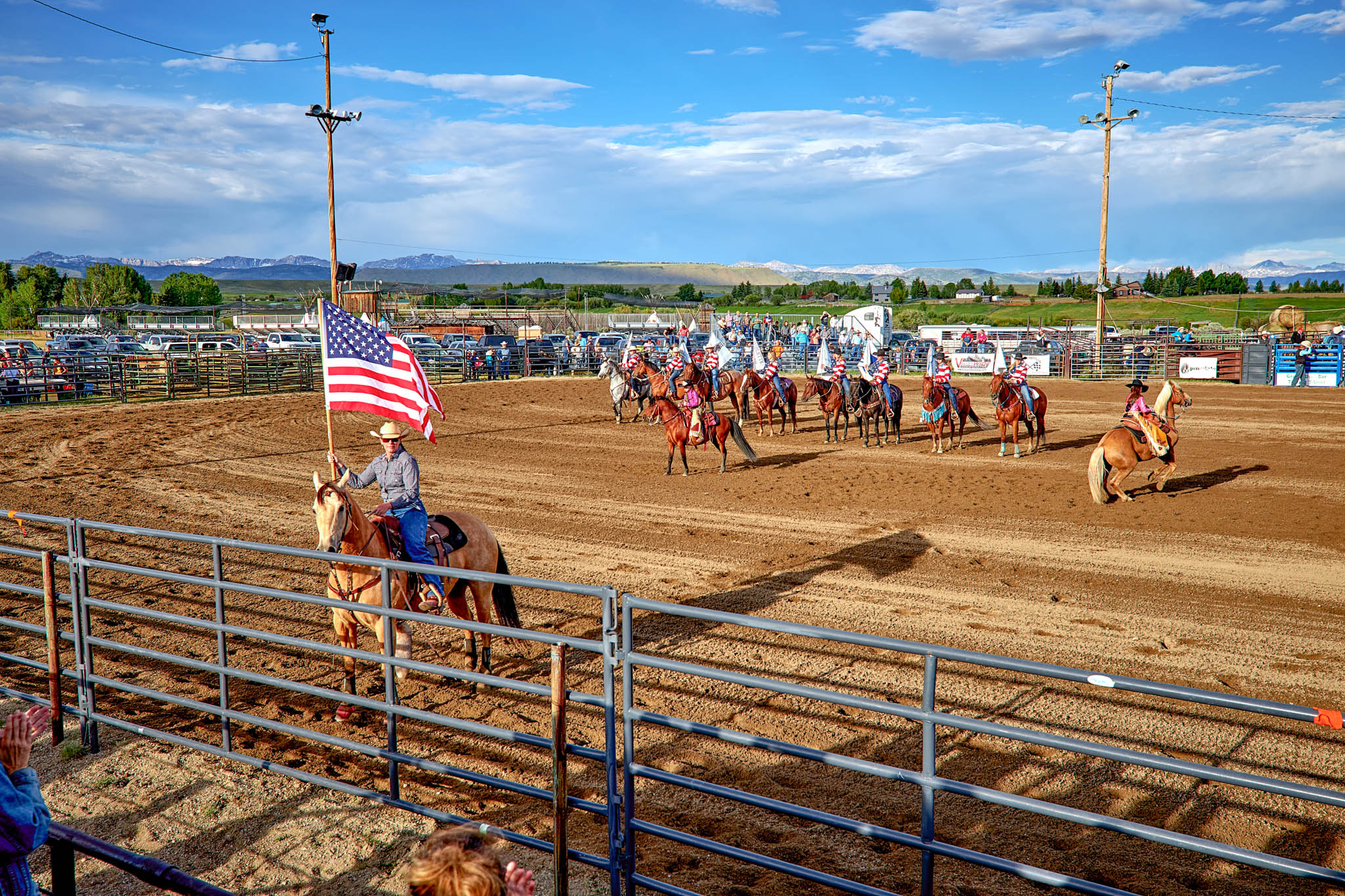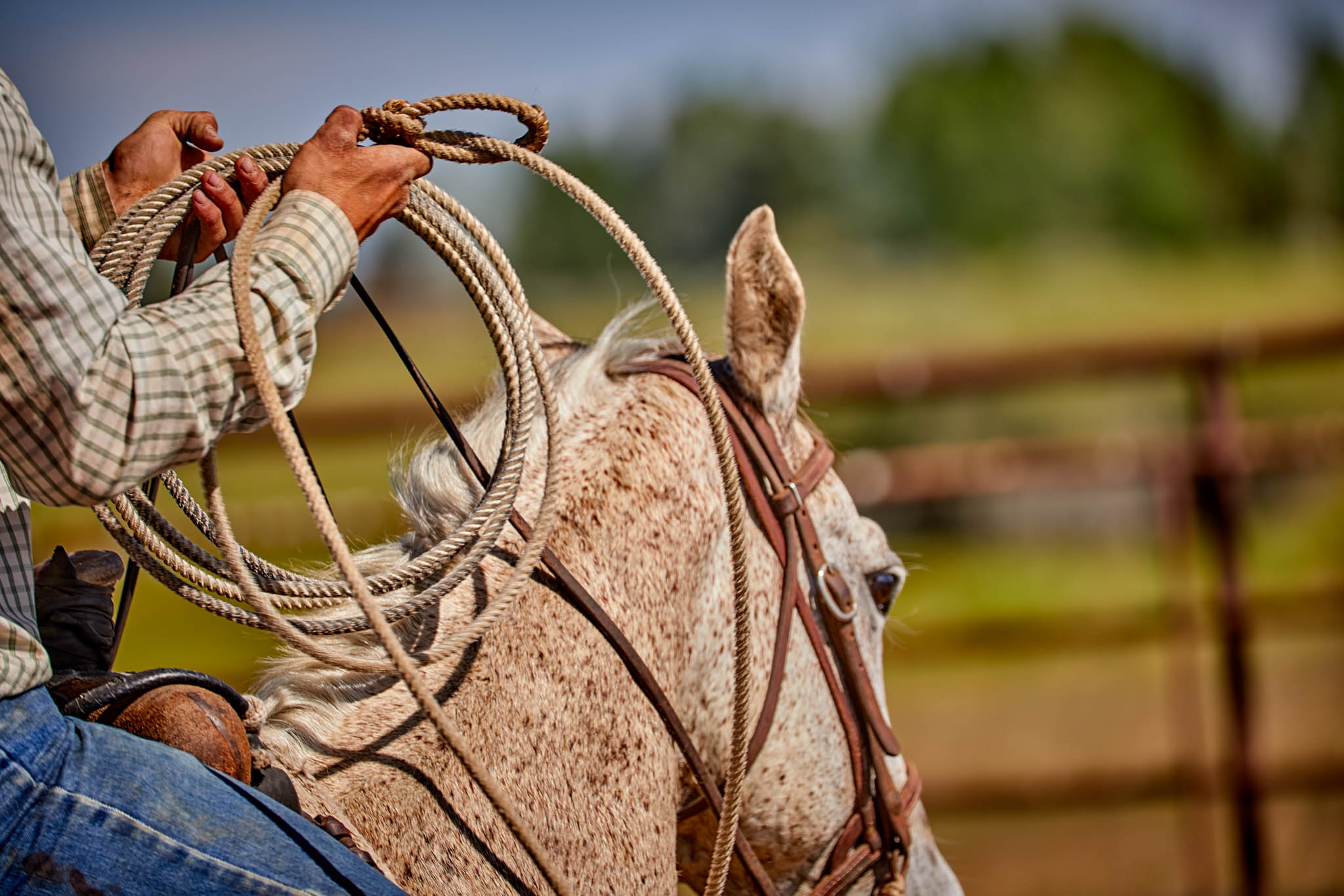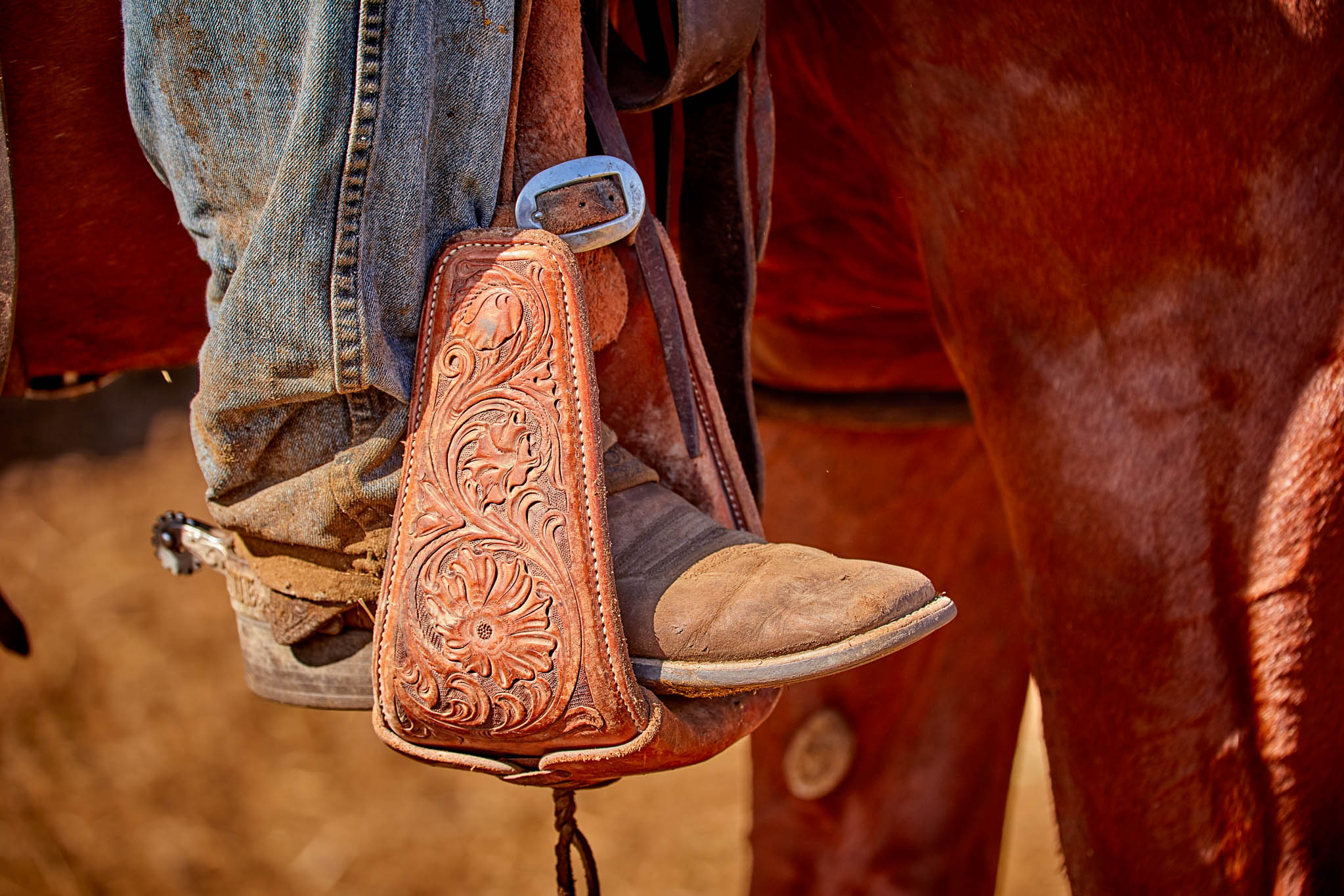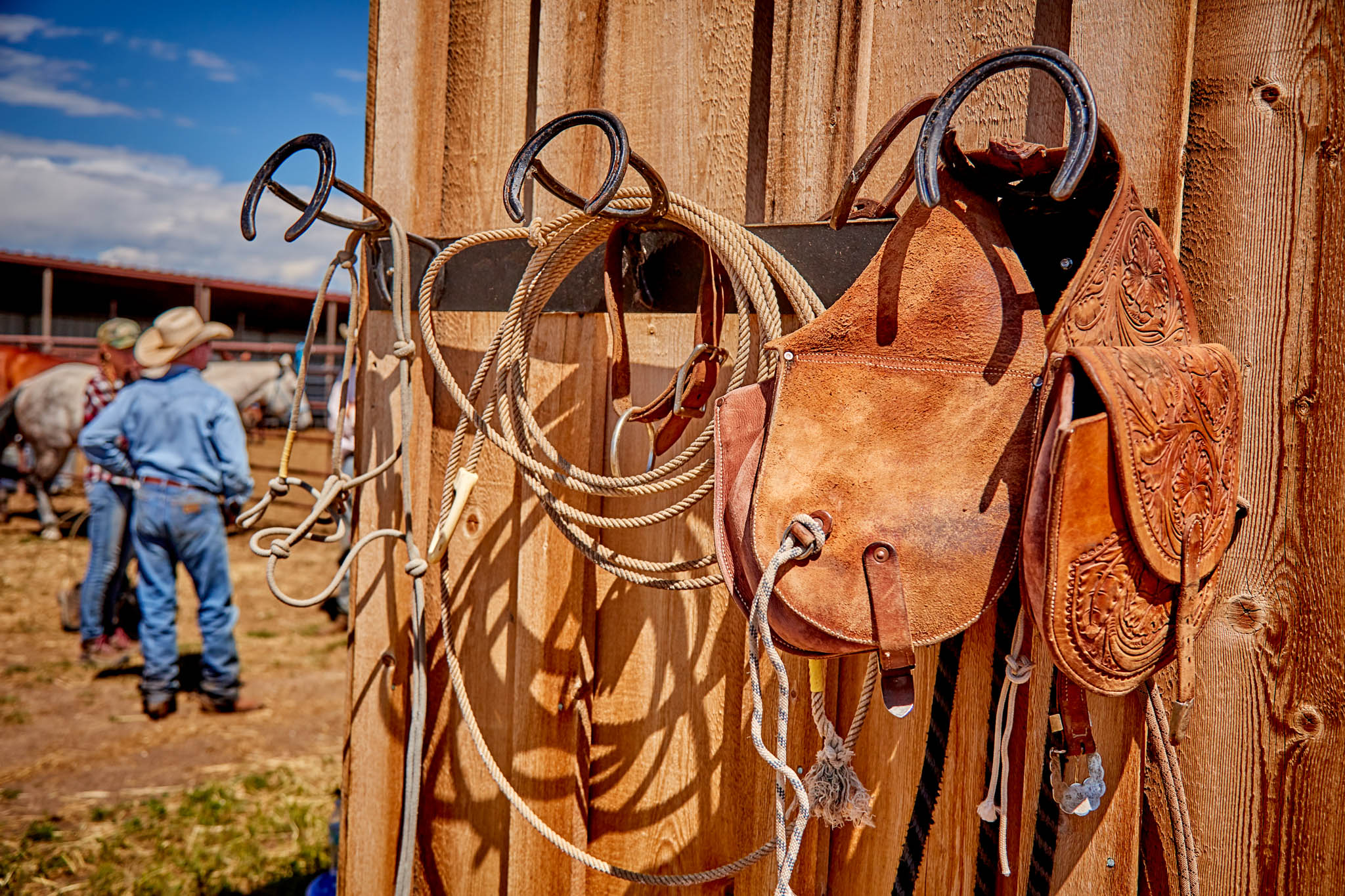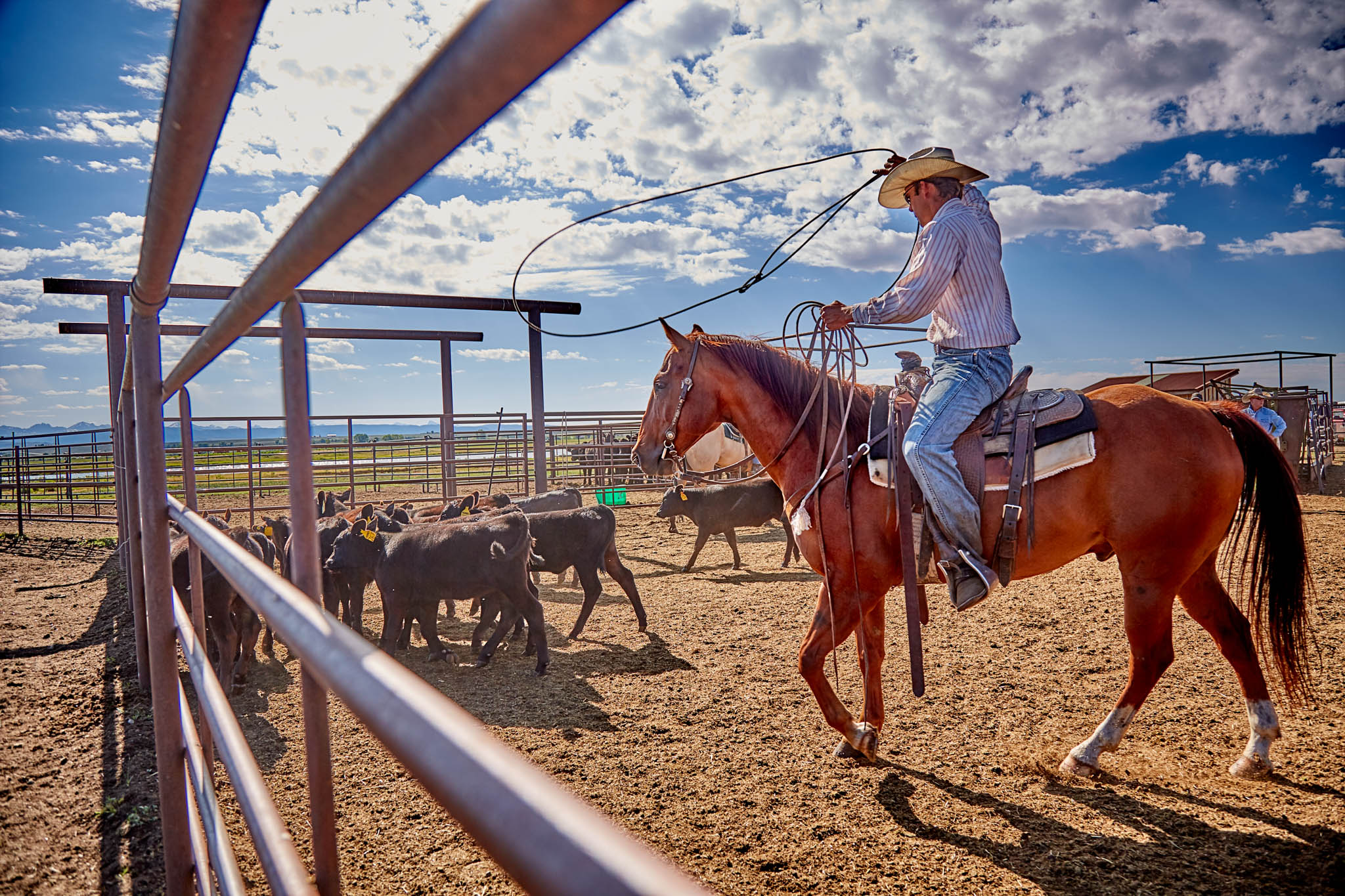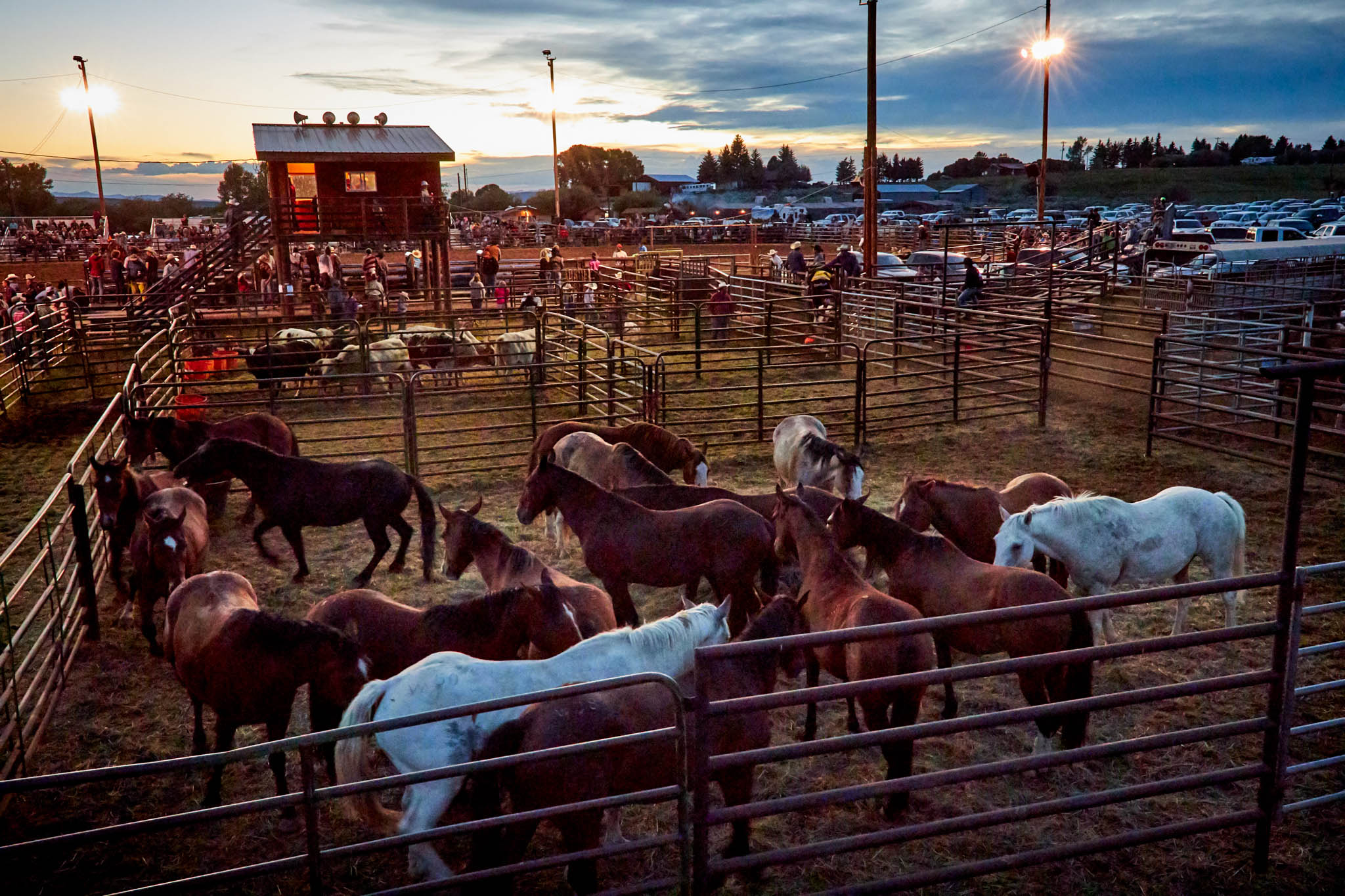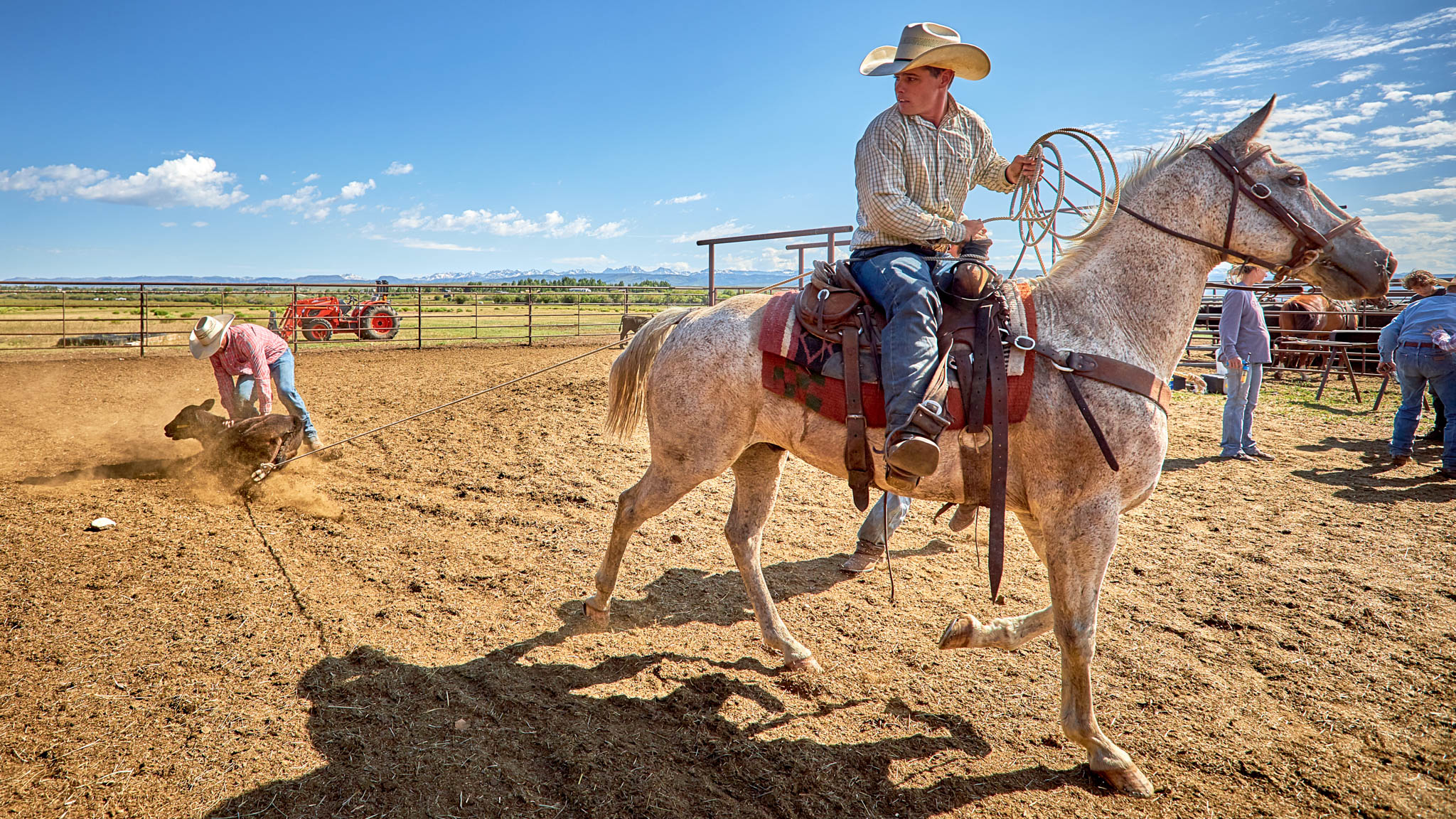Overland travel is a way of life, on the tracks of the pioneers who crossed the country one and a half centuries ago. But while it’s temporary for most of us, the cowboys of Wyoming live this active outdoor life with their family all year long. Responsible for feeding the American people, they’re still some of the freest persons you’ll ever meet.

After one week off-roading through the vast plains of Wyoming, where bald eagles, pronghorns, and cattle were the only visible life, we’re ready to drive our Ford Rangers FX4s back to civilization. The green grass turns golden as the sun sets and we reach the small town of Pinedale. The initial plan is to stay in town for a couple of hours, just enough to fill the tanks of the trucks and get some groceries. The plan is quickly forgotten when the friendly cashier tells us about a rodeo this same Friday night. In the summertime, there’s plenty of touristic attractions labeled rodeos that we would avoid at all cost, but this one is a real contest, with local cowboys and a local crowd attending. We might be the only ones in the public with neither hats nor boots, and we stuck out like Twinkies in a health club. Yet everybody is very friendly and, while horses and bulls try to get rid of their impudent riders, we chat with everybody around.
The show is intense, and the competition fierce, with big prize money on the table. Yet we see all these athletics cowboys joking with each other, sharing the same enthusiasm for their sport. Unlike many other mainstream events, the women are competing at the same time as the men, and with the same skills and determination … and that’s quite refreshing. At the end of the night, Wade Tibbits, a cowboy from Arizona who helps a lot of ranchers here in summer, invites us to see more of a rancher’s life next Monday. That’s the kind of once-in-a-lifetime experience that you can’t refuse, and our initial two hours stay in Pinedale is quickly rescheduled to last two more days.
A Nomadic Life
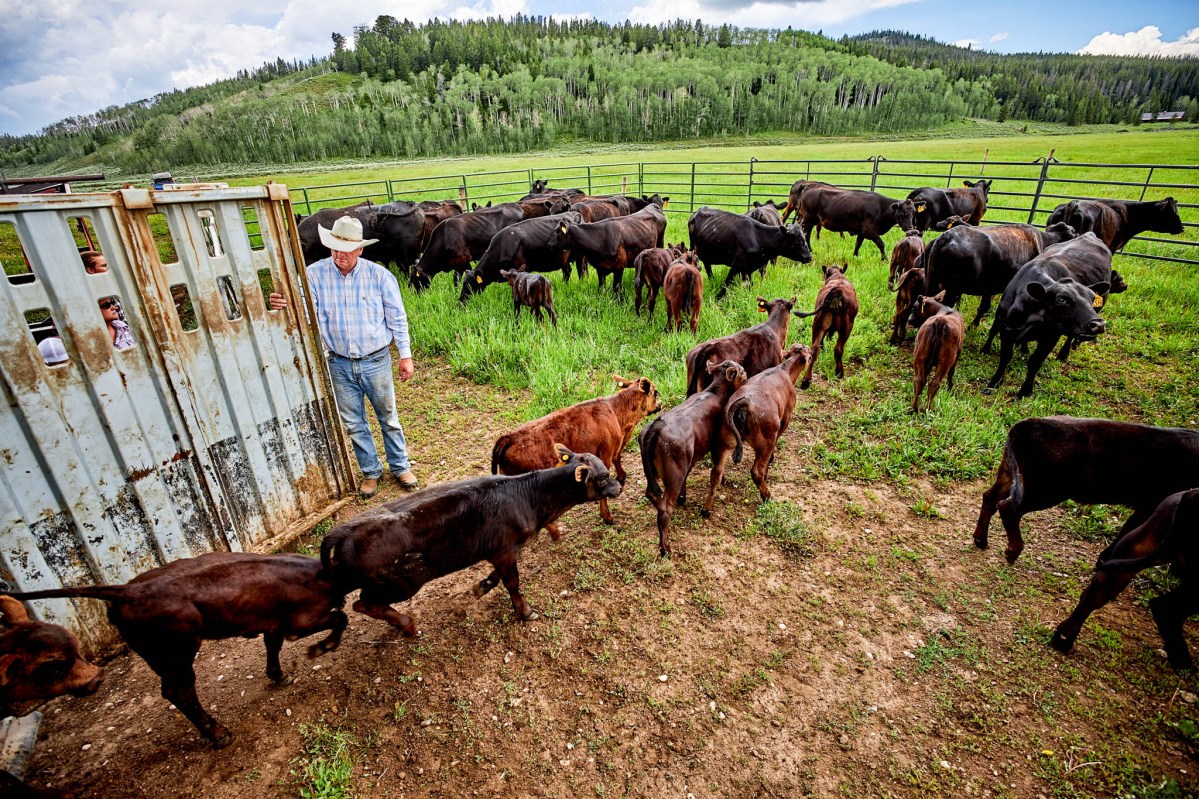
Wade’s wife, Kyndall, is not only the awesome mother of three kids but also one of the most skilled ropers in the country, in an event of the kind that has roots dating back to the Old West. The many-time WSRRA World champion can launch her horse like a rocket while throwing a loop around a calf’s neck in a heartbeat, or set fast times around barrels in a shower of sand with the speed of a fighter pilot. The Tibbits do contests all over the United States and won their fair share of medals, but they also organize events in Wickenburg, AZ, as well as give lessons in Kuiai during the winter. What would already be a busy schedule for anybody is far from enough to keep this hyperactive family busy.
While half of their life is dedicated to rodeos, the other half is all about feeding the American people and therefore living the life of true ranchers. When the weather gets too hot in their home in Arizona, they all move for 5 months to Wyoming, where they rent a nice ranch with an incredible view on the remote mountains. Here, they help eight different ranchers while taking care of their own cattle which stays in Wyoming all year long. This kind of nomadic life is not uncommon within the cowboy community. Jacob, a young man from San Diego, California, is also on the move. With his horse and his trailer, he goes from ranch to ranch and offers his services. “I have friends everywhere now, and a roof in any town I stop. I couldn’t be happier,” says the young cowboy. The loneliness of his job, where you need a gun to protect yourself against bears or to “achieve” an injured cow, doesn’t bother him much. Anything but a 9 to 5 job in an office!
Family Time
Today, there’s no solitude in sight since there’s some big teamwork planned. Wade, Kyndall, their kids, and Jacob are here to help Mike Vickrey, a local rancher from Pinedale, to brand his calves. His family has been in the business for six generations, and Mike keeps the tradition going, hiring his daughter and her husband to help during summer. Mike’s sister Nikol also came from Northern California with her husband and their two daughters. Last, but not least, Mike’s father Doug is here to give a hand, which makes three generations working together in the corral. “We learn from one generation to the other,” confirms Mike with a soft voice which reminds us of John Wayne. “There’s no school to teach you how to become a cowboy, it’s a degree in life. You better learn when you’re young because there’s a subtle way to move around cows, to be at the right place at the right moment.”
Indeed, the kids are not lost in their phones’ screens here. Instead, they wear blue jeans, boots, and hats, ready to help the adults. The ambiance is a mix of casual-normal-day-at-work and charming family reunion. Yet, the view of the white-hot iron bars in the fire is worrisome at first sight. But Wade is prompt to explain: “Branding the calves is certainly a stressful process, but it’s a short pain and they bounce back quickly. We know that today, with the public being so concerned with animal welfare, most people are uneasy, to say the least, with this technique. But that’s the only reliable method anybody ever found to identify the cattle in case of loss or, worst, in case of a theft. If there was an easier way, like electronic tags or whatever, we would take it,” he explains.
Wade seems to be very concerned by the public’s perception and doesn’t see why he should be labeled as the bad guy: “We feed the American people, and we want to offer the customers a great quality of meat. We take great care of our cows. We vaccine them, we track them to be sure they’re healthy, we feed them with good organic grass, we give them huge open range to graze freely. We do everything we can to make our cattle happy because when they’re happy, we’re happy, and the customers are happy. We’re definitively on the good side here. Our horses are like part of the family, and we treat them very well.” Comforted by this testimony of goodwill, we enter the corral, ready to help with the branding.
Fast and Efficient Process
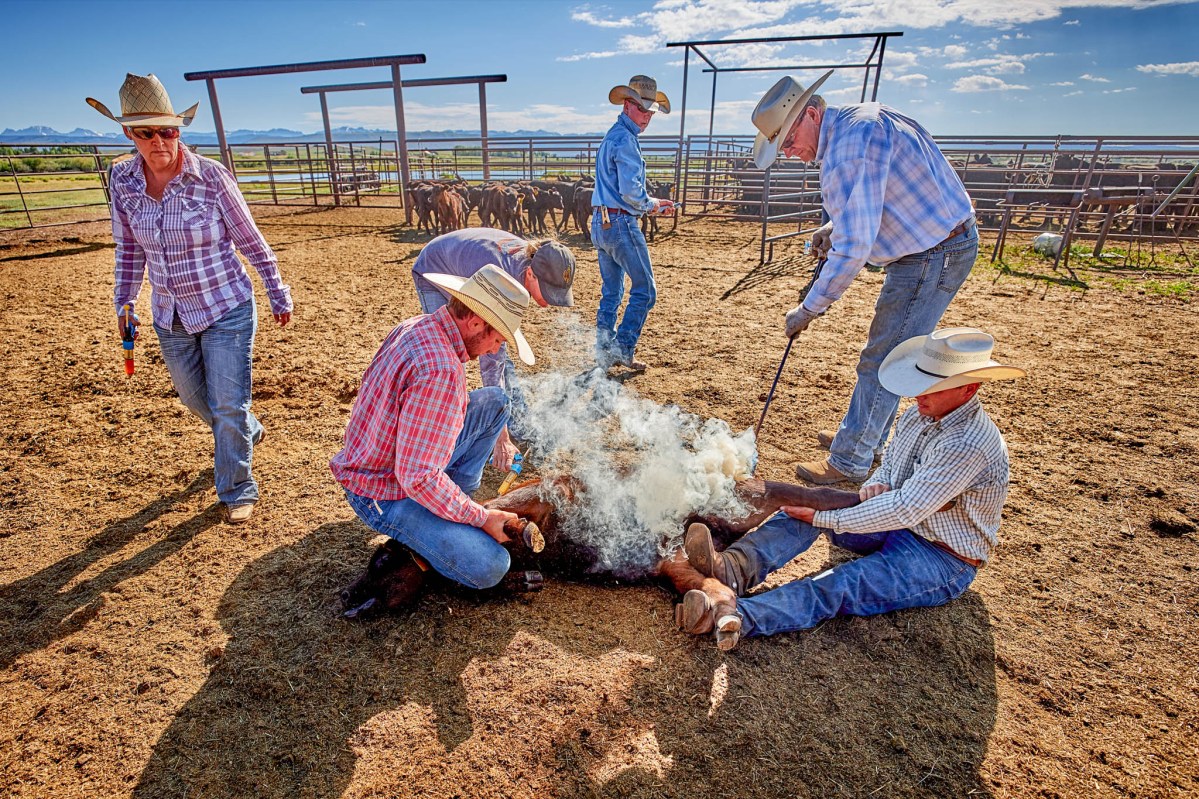
Kyndall, Wade, and Jacob are on the saddle of their big horses, catching the calves one by one with the ropes. The rest of us are in charge of swiveling each calf onto their side and to maintain their already big and muscular bodies on the ground using wrestling techniques. Then, three things happen pretty quickly: Mike will come with a branding iron and apply it on the calves’ skin, in a big cloud of smoke. Almost at the same time, Nikol will come with a syringe and do the vaccination, like a nurse would do for any human but with a way bigger needle. When it’s a male, John will use rubber bands to tighten the balls. “We need only one bull for thirty cows,” says Mike. “We don’t use ours, to avoid DNA issues, and buy bulls in Colorado instead, which allows us to mix genes. Back in the old days, they were cutting the balls, which was fast but cruel. Today, we use a painless process to castrate the males. These rubber bands which cut the blood circulation and within one week the balls will just fall,” he explains.
In a matter of seconds, these three operations are done and the calf goes back with the others. No limping, no moaning, the pain seems already forgotten. Sweating under the sun, breathing dust and wrestling the heavy animals, we keep working for a couple of hours to brand the sixty other calves. It seems pretty exhausting, but Jacob tell us that sometimes the cowboys brand up to five hundred calves in a row! “We have long days, for sure,” admits our rancher, “but we never complain because we know they’ll end eventually.”
Today is an easy one though, and our Californian teenagers have more time to get used to their new job under the patient direction of Mike and Wade. In the afternoon, cows and calves are transported in the pastures, where they’re reunited. The younger ones start immediately to milk their mothers. After a short time to let the mothers find their offspring, the gate is opened to set the cattle free. “These 60 cows will have 260 acres for themselves, it’s plenty of room to graze or do whatever they want,” Doug says.
The Secret of Happiness
“These cattle have a good life here,” adds Mike. “We take care of the land where they graze. That’s one of the most important parts of our job, the hidden part of the iceberg. We’re not farmers, but we own or lease land that we work to raise hay.”
That’s why cowboys like Wade are not only experts about horses, but can also build fences, harvest the hay for winter, fix trucks and trailers, as well as deal with predators. “Each year,” confirms Mike, “three to five percent of our cattle are killed by grizzly bears or wolves. To get a refund for the loss, we work with a biologist who can prove the cause of death.” On average, and as long as they can give birth, Mike’s cows will live from 12 to 14 years in this open range. Then, they will be sold to one of the few big companies which dominate the market in the U.S. “That’s where we lose our control,” explains Doug. “We know how much a calf costs us, but we don’t fix the prices. It’s like the stock market at Wall Street, you have no control. Sometimes, you won’t make any money on your cattle. And when you do, you need to invest it all in your ranch, which is your asset.”
With long hours in the cold or the hot weather, bugs that you never get used to, no retirement plan and low wages, being a cowboy might not sound like an appealing career. Even if the Vickrey’s ranch is a bit bigger than the average with 600 mother cows, 700 calves and a few yearlings, Mike and his wife have a regular job on the side during winter. But for Kyndall, her family commitment to this tough life is easy to explain: “It’s not a job. I’ve never worked in my life. It’s a passion for a certain lifestyle, where we can spend time together as a family. We love being outdoors, with our kids, our horses, taking care of our cattle. It’s all we need! The banks won’t loan us money to buy a house, even if we have plenty of assets with our trailers, our cattle, our trucks. But that’s not what matters. What’s important for us is that we’re happy in this life that we chose, and we will never have or want another one,” she says with passion and a smile warm enough to melt a horseshoe.
Then it’s time for everybody to go back to the ranch and have some burgers, but not with the kind of patties you’d find in your average supermarket. “I think people should try to buy the meat directly to the actual producer,” says Kindall. “The quality is not the same, and you’ll understand more what’s going on. It’s important to stay connected to reality and to eat some quality food as well as to build relationships with the people who feed you.” Overall, we spent only one day with the Tibbits and the Vickreys, but it seems like it changed our perspective for good. Leaving Pinedale in our pickup trucks, we can’t help but dream about a simple life with a true connection to nature and western history … Who knows, we might come back next year!
